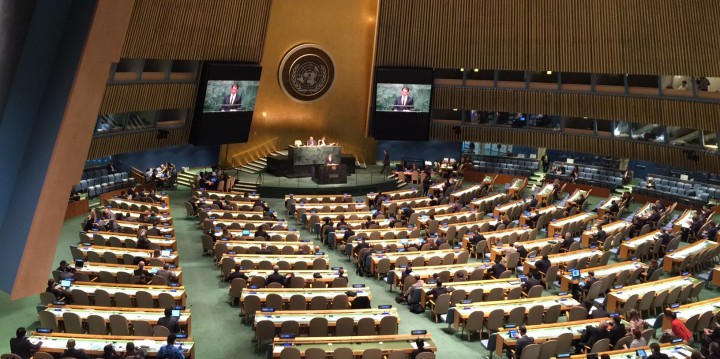“We were waist deep in the Big Muddy. The big fool said to push on.” — Pete Seeger
The NPT member states have to choose between two irreconcilable narratives, and the success of the 2015 Review Conference depends upon their making the right choice.
by John Loretz of International Physicians for the Prevention of Nuclear War
According to the nuclear-armed states and their closest allies, nuclear disarmament is moving along step by step at a realistic pace, and all that’s needed for the next five years is to keep slogging through the river.
The majority view, expressed during the first week of general debate, is a little different: the NPT has failed to grapple effectively with the humanitarian catastrophe nuclear weapons could bring about in the blink of an eye, and it’s long past time to head for dry land.
The evidence supporting that view, compiled over three conferences on the humanitarian impact of nuclear weapons, has now been introduced into the Review Conference in a working paper that the Austrian delegation has characterized as a “wake-up call.” An updated “Joint Statement on the Humanitarian Consequences of Nuclear Weapons” has been endorsed by 160 member states— 10 times as many as signed the first version at the 2012 NPT PrepCom. That’s close to 85% of the countries in the world insisting that “awareness of the catastrophic consequences of nuclear weapons must underpin all approaches and efforts towards nuclear disarmament” and that “the only way to guarantee that nuclear weapons will never be used again is through their total elimination.”
Half these countries have been willing to go even further by endorsing the Austrian Pledge, questioning the ethics and morality of holding onto nuclear weapons despite awareness of the consequences, and signaling their willingness to work actively for a legal prohibition. That number will almost certainly increase by the close of this Review Conference.
Convinced that this time we’ll all make it through the Big Muddy if we just push on, a group of 26 states organized by Australia are so rattled by the humanitarian impact movement that they felt compelled to acknowledge the evidence presented at the three HINW conferences while protesting that consequences are only one side of the story. There are “security dimensions,” after all, and conditions that need to be created in order for the hard, practical work of disarmament to proceed, and so forth. Japan, which has gone practically bipolar in its attempts to support nuclear disarmament and extended deterrence at the same time, mumbled something about “the necessity to continue to employ an appropriate security policy, taking into account the increasingly severe security environment.”
This group, to be fair, says it embraces the humanitarian impacts movement and doesn’t care much for the modernization programs of the nuclear-armed states. But actually banning nuclear weapons? That would be…well…cheeky, after our friends were kind enough to extend deterrence in our direction and all.
So as we push on into week two, there are 29 states floundering in the neck-deep waters, and 160 (give or take Japan) moving toward the shore. Which makes it sink-or-swim time for the NPT.






